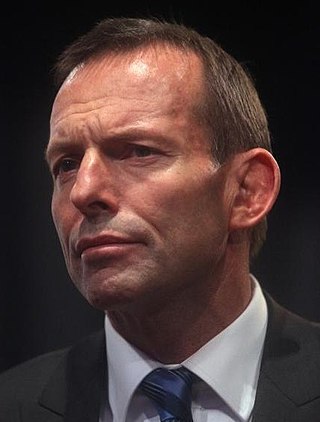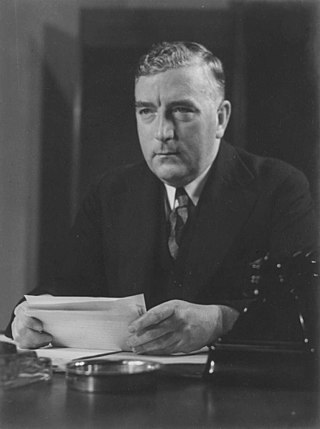
The Liberal Party of Australia is a centre-right political party in Australia. It is one of the two major parties in Australian politics, the other being the Australian Labor Party. The Liberal Party was founded in 1944 as the successor to the United Australia Party. Historically the most successful political party in Australia’s history, the Liberal Party is now in opposition at a federal level, although it presently holds government in the Northern Territory, Queensland and Tasmania at a sub-national level.
The National Party of Australia, commonly known as the Nationals or simply the Nats, is a centre-right and agrarian political party in Australia. Traditionally representing graziers, farmers, and rural voters generally, it began as the Australian Country Party in 1920 at a federal level.

The prime minister of Australia is the head of government of the Commonwealth of Australia. The prime minister is the chair of the Cabinet of Australia and thus the head of the federal executive government. Under the principles of responsible government, the prime minister is both responsible to and a member of the Commonwealth Parliament. The current prime minister is Anthony Albanese of the Australian Labor Party, who assumed the office on 23 May 2022.

Sir Robert Gordon Menzies was an Australian politician and lawyer who served as the 12th prime minister of Australia from 1939 to 1941 and from 1949 to 1966. He held office as the leader of the United Australia Party (UAP) in his first term, and subsequently as the inaugural leader of the Liberal Party of Australia, which he was responsible for establishing and defining in policy and political outreach. He is the longest-serving prime minister in Australian history.

The United Australia Party (UAP) was an Australian political party that was founded in 1931 and dissolved in 1945. The party won four federal elections in that time, usually governing in coalition with the Country Party. It provided two prime ministers: Joseph Lyons (1932–1939) and Robert Menzies (1939–1941).

Sir Arthur William Fadden was an Australian politician and accountant who served as the 13th prime minister of Australia from 29 August to 7 October 1941. He was the leader of the Country Party from 1940 to 1958 and served as treasurer of Australia from 1940 to 1941 and 1949 to 1958.

Anthony John Abbott is an Australian former politician who served as the 28th prime minister of Australia from 2013 to 2015. He held office as the leader of the Liberal Party of Australia and was the member of parliament (MP) for the New South Wales division of Warringah from 1994 to 2019.

The Liberal–National Coalition, commonly known simply as the Coalition or the LNP, is an alliance of centre-right to right-wing political parties that forms one of the two major groupings in Australian federal politics. The two partners in the Coalition are the Liberal Party of Australia and the National Party of Australia. Its main opponent is the Australian Labor Party (ALP); the two forces are often regarded as operating in a two-party system. The Coalition was last in government from 2013 to 2022. The group is led by Peter Dutton, who succeeded Scott Morrison after the 2022 federal election.

On 22 September 1951, a referendum was held in Australia which sought approval to alter the Australian Constitution to give Parliament the power to make laws regarding communism and communists, so that the Parliament would be empowered to instate a law similar to the Communist Party Dissolution Act of 1950. It was not carried.
Faceless men is a term from Australian politics. The term is generally used to refer to men and women who exert political influence and are not elected representatives to state, territory or federal legislative bodies, yet are elected representatives to bodies that determine political party policies. However, the political tactic of elected representatives canvassing party members for support on policies varies widely amongst Australian political parties.
The history of Australia since 1945 has seen long periods of economic prosperity and the introduction of an expanded and multi-ethnic immigration program, which has coincided with moves away from Britain in political, social and cultural terms and towards increasing engagement with the United States and Asia.

The Gillard government was the Government of Australia led by the 27th prime minister of Australia, Julia Gillard, of the Australian Labor Party. The Gillard government succeeded the first Rudd government by way of the Labor Party leadership spill, and began on 24 June 2010, with Gillard sworn in as prime minister by the governor-general of Australia, Quentin Bryce. The Gillard government ended when Kevin Rudd won back the leadership of the Australian Labor Party on 26 June 2013 and commenced the second Rudd government.

The Menzies government (1949–1966) refers to the second period of federal executive government of Australia led by Prime Minister Robert Menzies. It was made up of members of a Liberal–Country Party coalition in the Australian Parliament from 1949 to 1966. Menzies led the Liberal–Country Coalition to election victories in 1949, 1951, 1954, 1955, 1958, 1961 and 1963. Robert Menzies was Australia's longest serving prime minister. He had served a previous term as prime minister as leader of the United Australia Party from 1939 to 1941. Although he would retire in 1966, his party would remain in office until 1972, an unprecedented 23 years of government from nine consecutive election victories.

The Curtin government was the federal executive government of Australia led by Prime Minister John Curtin. It was made up of members of the Australian Labor Party in the Australian Parliament from 1941 to 1945.

The Menzies government (1939–1941) refers to the federal executive government of Australia led by Prime Minister Robert Menzies. Menzies led the United Australia Party in the Australian Parliament from 1939 to 1941. Menzies served a later and longer term as prime minister as leader of a successor party, the Liberal Party of Australia from 1949 to 1966.

The Fadden government was the federal executive government of Australia led by Prime Minister Arthur Fadden, as leader of the Country Party. He was appointed prime minister on 29 August 1941, during World War II, following the resignation of Robert Menzies of the United Australia Party (UAP). Fadden continued the coalition government between the Country Party and the UAP, but after just over one month in office the government was defeated on a confidence motion. Fadden was succeeded as prime minister on 7 October 1941 by John Curtin of the Australian Labor Party (ALP).

A motion seeking a leadership spill of the federal parliamentary leader of the Liberal Party of Australia and Prime Minister was proposed by Malcolm Turnbull, who requested the ballot on 14 September 2015. The incumbent Prime Minister, Tony Abbott, announced that a meeting of Liberal members of the House and Senate would take place at 9:15 pm AEST on 14 September 2015 for the purpose of a spill motion. During the meeting a vote was held for the leadership and deputy leadership. Turnbull defeated Abbott, 54 votes to 44, becoming the leader of the Liberal Party of Australia and Prime Minister-nominee. Julie Bishop retained her position of deputy leader defeating Kevin Andrews 70 votes to 30.

On 13 February 2008, the Parliament of Australia issued a formal apology to Indigenous Australians for forced removals of Australian Indigenous children from their families by Australian federal and state government agencies. The apology was delivered by Prime Minister Kevin Rudd, and is also referred to as the National Apology, or simply The Apology.

The Leader of the Liberal Party, also known as Leader of the Parliamentary Liberal Party, is the highest office within the Liberal Party of Australia and the Liberal–National Coalition. The position is currently, and has been since 30 May 2022, held by Peter Dutton, who represents the Division of Dickson in Queensland. Peter Dutton is the fifteenth leader of the Liberal Party. Dutton is also the first leader of the party to represent a Queensland electorate.
This page details numerous records and characteristics of individuals who have held the office of Prime Minister of Australia.















